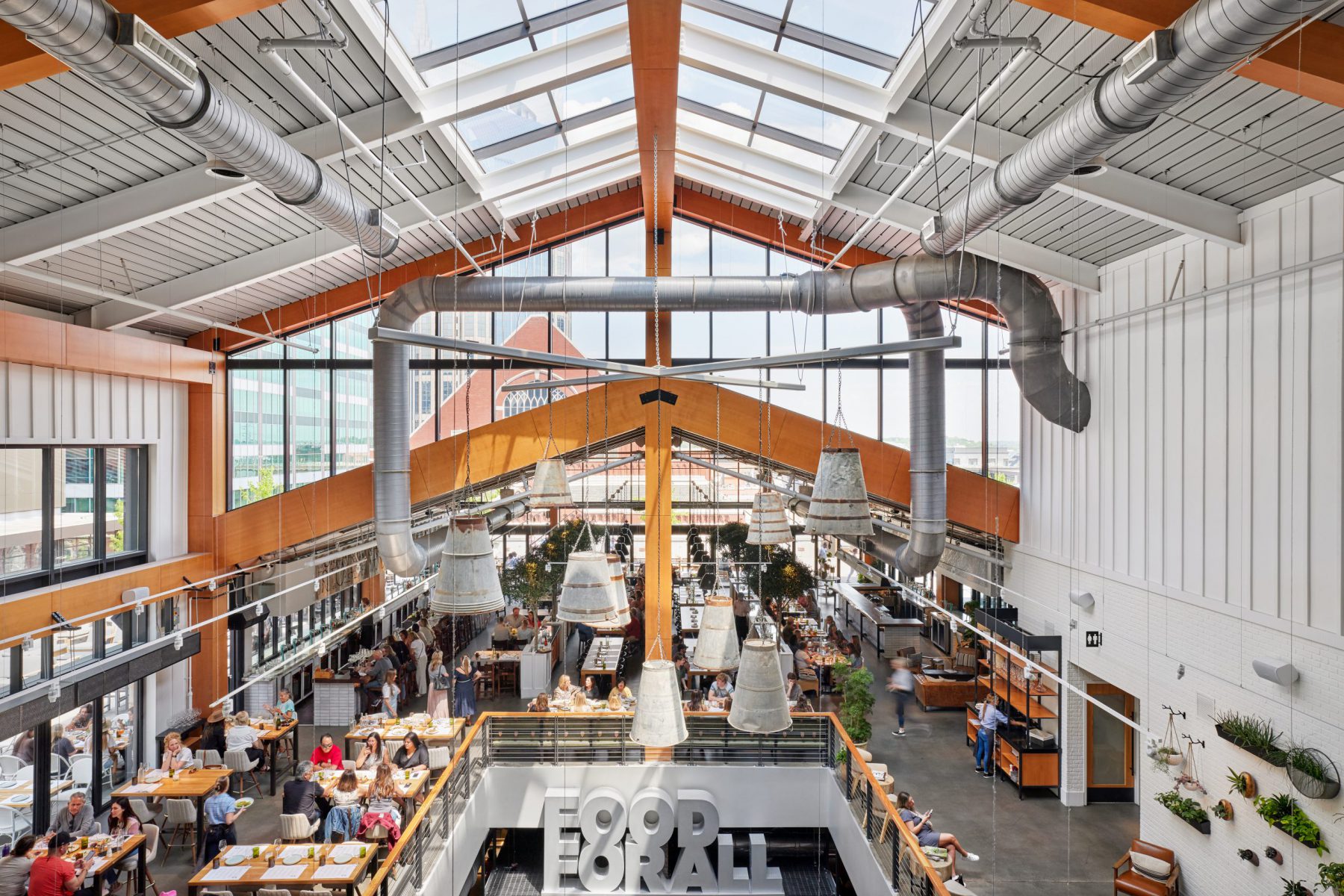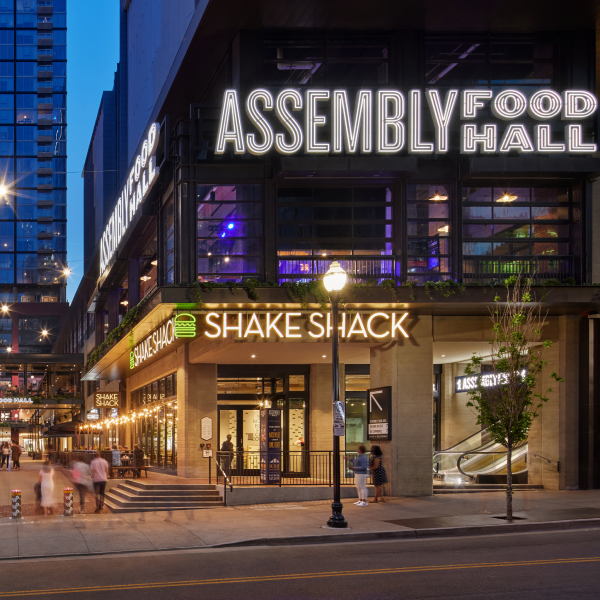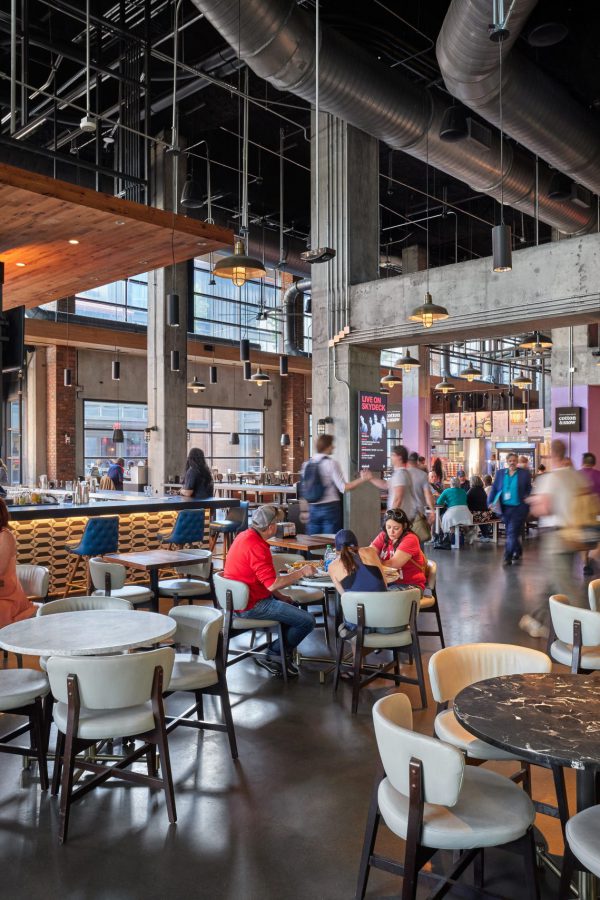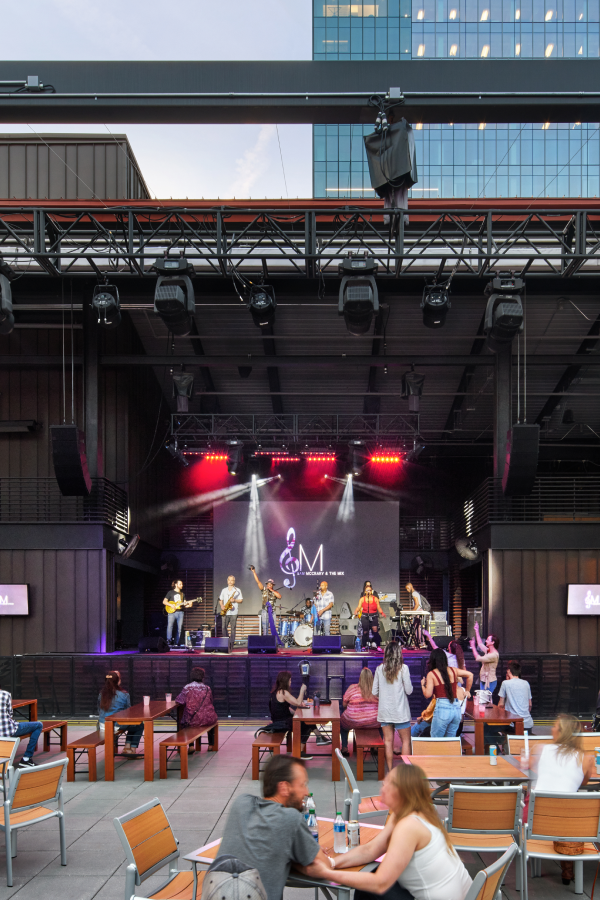Bringing Assembly Food Hall to Life

Project
Overview
Project Name
Assembly Food Hall and Entertainment Venue
Size
100,000 GSF
Market Sector Details
Entertainment/Performing Arts Facility in Nashville, TN
Client
The Food Hall Co.
Team
Gensler
The Best Food Hall in the Country
Touted as the “Best Food Hall in the Country” according to enjoytravel.com, Assembly Food Hall (Assembly) provides visitors and denizens of downtown Nashville with an innovative culinary and entertainment experience. Located at the heart of Nashville’s reimagined urban core, Assembly offers a centralized gathering place within the Fifth + Broadway (5+B) mixed use development, that hosts dining options from over 30 vendors as well as the largest rooftop entertainment venue in the Nashville metro.
Behind the dazzling rooftop performance space and stunning open-concept design lies a complex infrastructure of robust building systems. These systems ensure that Assembly provides vendors with a multitude of kitchen configuration options, clean air inside and around the facility, and can keep pace with the demanding utility needs of commercial kitchens. On top of these requirements, our design team worked collaboratively with the owners and architect to adequately service the project’s fast-paced need for design alterations.


Keeping Assembly Food Hall Fresh
A massive undertaking on this project was coordinating and designing the HVAC system that services dozens of vendors as well as a full-service restaurant. Brian Nevole, P.E., a lead mechanical engineer on the project, was involved in ensuring the HVAC design on the Assembly would not disturb its interior aesthetics while ensuring the systems kept interior and exhaust air clean. Brian explained that, in order for the site to boast a wide variety of food options, the project required a complex infrastructure for kitchen exhaust and grease waste systems.
“We had to provide a unique exhaust solution for restaurants that had charcoal-burning and wood-fired ovens,” Brian explained, “Since the northern portion of the Assembly is located on the bottom of an office tower, we couldn’t exhaust any of the grease vertically. Everything had to run through an air scrubber before it went outside.”
By providing air scrubbers to the solid fuel-burning commercial kitchen ventilation system, our team was able to exhaust the air without disturbing pedestrians and created a code-compliant solution.
“Solid fuel cooking applications, compared to normal grease cooking, just create more particulates in the exhaust stream that can catch on fire quite easily,” Brian explained, “Those scrubbers are responsible for keeping the ductwork clean and free from grease buildup.”
The fast-paced nature of the restaurant industry can make it difficult to anticipate what each vending location could be used for. By providing the vendor spaces with multiple utility outlets, the mechanical design allows Assembly to market their spaces to a variety of vendors. A flexible design was necessary to keep pace with the rapidly evolving needs of the food hall.
“Throughout the design phase, we had an ice cream place turn into a pizza place, which then turned into a barbeque joint,” Brian explained, “Providing water, heating, and ventilation solutions that can meet the demands of all these different places was imperative to a successful design.”
Providing utility services to each and every vendor space meant a robust infrastructure system that required ample square footage. In response to this design challenge, our team utilized tankless water heaters so that vendors could create hot water on demand without needing large water heater tanks that would put a strain on the space necessary to house the utility systems. Our team collaborated closely with the Gensler architectural team to find advantageous places to house HVAC ductwork, plumbing, chilled-water loop pipes, and electrical conduits to optimize the building system’s space usage.
“We worked closely with the architect to hide the building systems in columns, distribute utility hookups from below, and hide them behind walls,” Brian explained, “There were a lot of creative strategies there that we had to implement in order to give the food hall the open-air aesthetic that Gensler and the owner wanted to achieve.”
Powering Assembly Food Hall
One of the largest challenges in a facility of this size and scale was to provide adequate power to each space and deliver proper load allocation to over forty vendor locations, as well as a full-service restaurant and a large entertainment venue. Fortunately, our previous experience working on the core and shell of the 5+B project gave our team an additional level of insight when formulating the schematic design and power distribution for the Assembly project. Brandon Rich, P.E., LEED AP BD+C, WELL AP, Fitwel Ambassador, WiredScore AP, is an Alvine Engineering Principal and a lead electrical engineer on the project who ensured the Assembly received high-performance electrical solutions.
“Being able to work on the two projects simultaneously gave us a big advantage,” Brandon stated, “It allowed us to streamline the electrical design and come up with flexible solutions in an efficient manner as we anticipated that the layout was subject to change.”
An encompassing design challenge for the project team was finding ample space for building system distribution across the unique layout of the Assembly. Assembly spans across two buildings, with the bottom level being connected by a singular bridge. Extensive coordination was needed to allocate enough space for each system to be distributed across the bridge.
“We had to be very considerate of panel sizing,” Brandon explained, “Our electrical team wanted to ensure the infrastructure could service a wide variety of tenants.”

Our electrical team also worked with a theatrical lighting vendor, which required us to navigate unique lighting products and materials to provide the best lighting solutions available for the project.
Despite the rapidly evolving nature of the Assembly project, our firm’s extensive experience working with Gensler’s team familiarized us with their processes and workflows, which allowed the project team to adapt well to changes and addendums in design and construction.
“We gained newfound experience working with Gensler on a project of this unique nature,” Brandon explained, “We got to work with some great designers and architects out of their Dallas office. The experience was valuable and enriching for our partnership.”
Overcoming Obstacles
Not only did our project team meet all of the expectations and changes in design, but also had to adapt to the rapidly changing construction landscape brought on by the onset of the COVID-19 pandemic.
“I remember doing virtual punch lists and walkthroughs,” Brian Nevole stated, “Anything we could do to help keep the project moving forward despite the challenges and limitations of COVID-19 was a high priority.”
Overall, the uniqueness of the space, the vast number of services required to maintain its functionality, and execution through design to construction are testaments to our team’s ability to collaborate with clients and architects, as well as our expertise in design.
“Designing the food hall was a great experience that provided us with valuable takeaways,” Brandon concluded, “It’s a space that we’re quite proud to be a part of, and it’s become a staple of Nashville’s downtown experience.”




